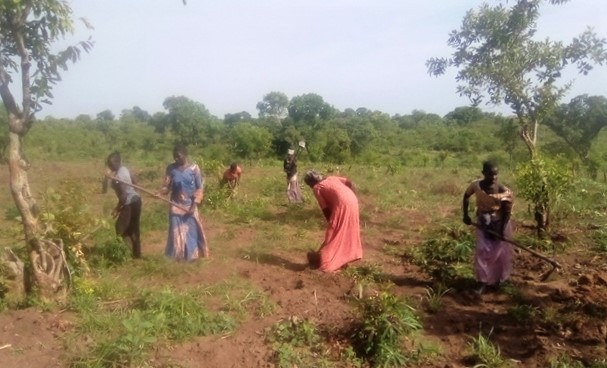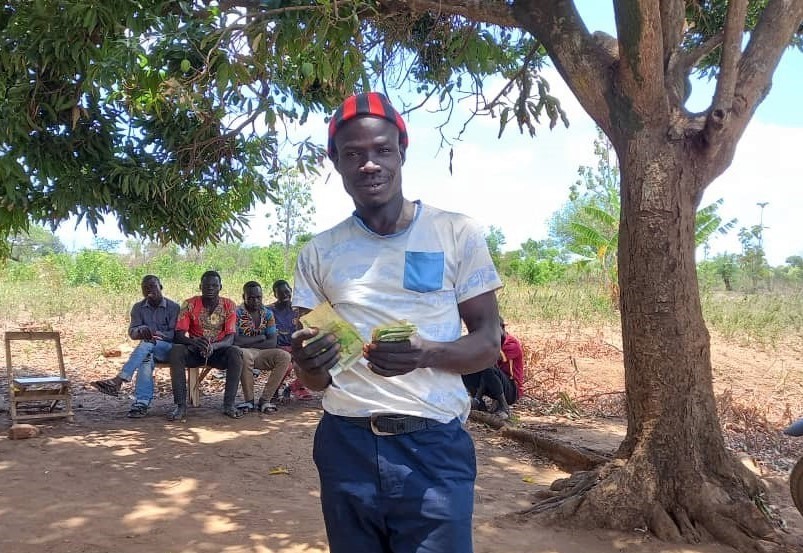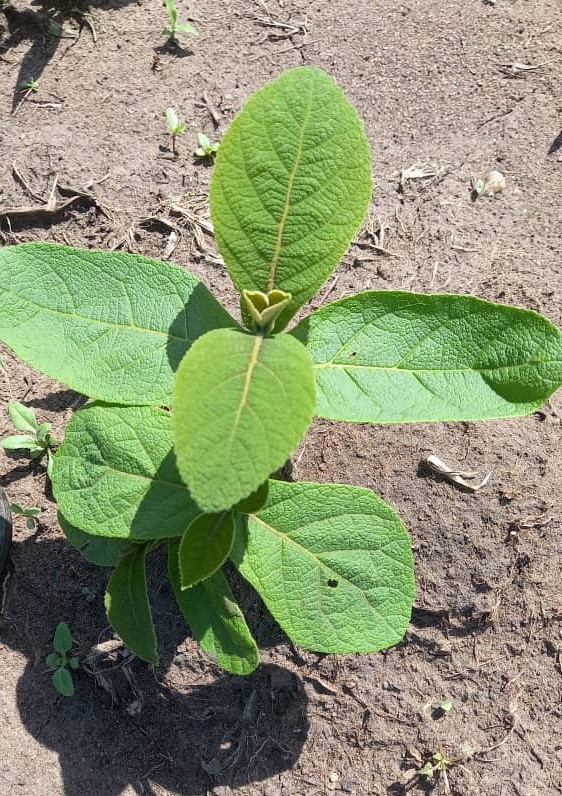Authors: Deborah Nabukeera, David Ogwang
Photo credits: HEKS / EPER Uganda and ACORD Uganda
In Uganda, HEKS/EPER and its partner organization ACORD-U are taking a holistic approach to improve the water, sanitation and hygiene (WASH) services for their target population. The WASH project is co-founded by the Swiss Water and Sanitation Consortium (SWSC). To ensure protection and preservation of ground water, the project not only focuses on conventional WASH activities but also on agroforestry, rehabilitation of degraded range land and tree planting in watersheds.
The growing host community population as well as the influx of refugees in the district of the Bidibidi refugee settlement has increased pressure on natural resources, such as land, water, range land, and fuel wood. This settlement is the second largest refugee settlement in the world and is home to over 240,000 South Sudanese refugees (UNHCR 2022). Anthropogenic activities, such as the creation of housing areas, agriculture, the need for raw materials for infrastructure development, use of fuel wood, etc., have immensely contributed to the depletion of vegetation and ecosystems in the area. As a result, the Bidibidi area experiences ground water depletion resulting in the reduction of the water quantity available and at worst the drying of water sources (bore holes & spring wells). Furthermore, other degradation effects are visible, such as soil erosion by wind and water, soil compaction, soil contamination by oil due to poor disposal, loss of habitats and waterlogging[1].
A WASH project with integrated environmental protection activities, such as promotion of agroforestry and rehabilitation of degraded range land, is implemented by ACORD Uganda with the support of HEKS/EPER and the SWSC. The project strongly benefited from the engagement of the Yumbe District Natural Resources and Environment Office who organized formal engagement meetings with local leaders and community members and offered technical guidance on tree planting. This led to an awareness creation about causes, effects and impacts of environment degradation as well as the importance of preservation and restoration of the environment and their impact on water supply in communities and schools. Furthermore, it triggered community members to offer land for tree planting to restore and conserve the degraded environment.
As a result of successful community engagement, the project has established two woodlots (estimated area of 11 acres) in the host community of Tokulu village in zone 5 of the Bidibidi settlement and supported seven schools (Nipata SS, Abiriamajo, Moli, Nyoko, Knowledge land, Ariwa and Ayivu primary schools) with a total of 6,000 tree seedlings of different species. The trees were of the following kinds: Giant Lira, Gravellia, Maesopsis (musizi), Mvule, Melina, Calliandra as well as grafted mangoes and guavas fruit trees. The established woodlots are owned and operated by the landlords. Mansur Aviola, one of the landlords says:
As a landlord and one of the beneficiaries, I am so grateful to the project for supporting us with tree seedlings. I had land which was unutilized until we established a woodlot. Now I’m considering introducing leguminous crops (e.g. beans) and staple foods (e.g. cassava) in the woodlot for more ecosystem and dietary diversity.
Mansur Aviola is optimistic that the woodlot will contribute to reducing the effects of climate change and benefit the preservation of ground water.
A cash for work approach was adopted by the project to pay community groups for land preparation and woodlot planting. Thanks to the initiative and leadership of women, the community group formed the Tokulu Youth Village Savings and Loan Association (VSLA) which started with 8 members and daily contributions. Currently, 30 individual members (5 men and 25 women) meet once a week and each weekly contribute 10,000 UGX (2.7 USD).
Mansur explains:
The purpose of the community group is to improve the environment and at the same time to support the livelihoods of the community members. Because of the VSLA, some of us now bought goats and some have started poultry farms as income generating activities.
In addition, the district environment department provided technical guidance and supervision of planting during the set-up of the woodlots. Mr. Solo Andama, a Senior Environmental Officer of the Yumbe District Local Government states:
The planted trees are vital to increase the vegetation cover and will contribute to mitigate climate change impacts. The fruit trees planted in schools are anticipated to supplement nutrition and act as learning central points for children in schools.
Consultations between the Yumbe Local Government and the International Union for Conservation of Nature (IUCN) are ongoing to ensure the sustainability of such initiatives by developing action plans and reforming ordinances on Environmental and Natural resource. The District Natural Resources and Environment department with support from Sub counties already reinstated ordinance and byelaws to discourage tree cutting and charcoal trading. The ordinance stipulates that, two trees must be planted when a person cuts one tree and non-compliance results in a fine of UGX 100,000-UGX 250,000 (27-68 USD).
[1] Waterlogging refers to temporary or permanent saturation of soil in the root zone of a plant which constrains plant growth.



